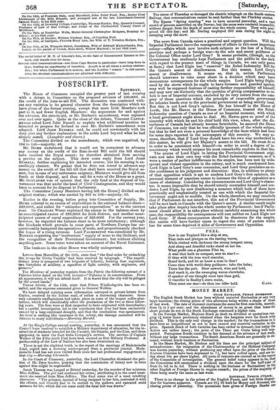POSTSCRIPT.
SATURDAY.
The House of Commons occupied the greater part of last evening with a debate in Committee on the proposed advance of 100,0001. on the credit of the Rate-in-aid Bill. The discussion was continued with- out any variation in its general character from the description which we have given of the former evening, except that more Irish Members took part in it, and fewer English Members: the arguments for and against the advance, the rate-in-aid, or Mr. Herbert's amendment, were repeated over and over again. Quite at the close of the debate, Viscount CASTLE- atAcut asked Lord John Russell to explain what additional taxation he intended to propose for Ireland in case Mr. Herbert's amendment were adepted. Lord Jona RUSSELL said, he could not consistently with his duty give any further explanation to the noble Lord beyond what he had already stated. (Laughter and cheers.)
The Committee divided on the amendment; which was negatived, by 194 to 146—majority, 48.
Mr. Hama understood that it would not be competent to advance any money on the credit of the Rate-in-aid Bill until the bill should have received the Royal assent; he therefore abstained from moving a proviso on the subject. This drew some reply from Lord Join; RUSSELL, further explaining his intended course; but his meaning is ex- ceedingly obscure. We gather that be does not intend to advance any money on the credit of the bill till that shall have received the Royal as- sent; but in case of any unforeseen exigency, Ministers would give aid from funds at their disposal, and then call for a vote of the House as a grant. Mr. Gouratuars was of opinion that the only fund at the disposal of Go- vernment was that under the head of Civil Contingencies, and they would have to account for its disposal to Parliament.
The Committee [many Members having left the House] divided on the original motion; which was carried by 201 to 106—majority, 95.
Earlier in the evening, before going into Committee of Supply, Mr. HUME referred to an excess of expenditure in the national balance-sheet-- 269,0001., and called for "estimates and expectations" as to the current year. Sir Cuantzs WOOD explained the excess in the balance-sheet by an unanticipated excess of 389,0001. for Irish distress, and another unan- ticipated excess of naval expenditure of 328,0001. For the current year, however, he expected the balance sheet to be more satisfactory; although the blockade which prevails in some parts of Northern Europe has un- questionably hampered the operations of trade, and proportionately checked the hopes of a rising revenue. Lord PALMERSTON was catechized by Mr. BANRES respecting the " inadvertent" supply of arms to the Sicilians, and the recognition of their Provisional Government; but without eliciting anything new. Some votes were taken on account of the Naval Estimates.
The business in the other House was wholly unimportant.


























 Previous page
Previous page